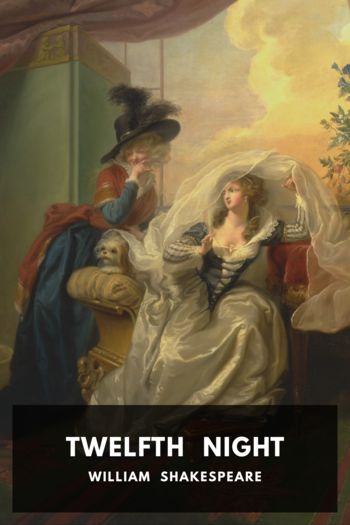Twelfth Night by William Shakespeare (pdf to ebook reader TXT) 📕

Description
A storm has caused a terrible shipwreck off the Illyrian coast. Two siblings, Viola and her brother Sebastian, become separated, each believing the other has drowned. Viola washes ashore and meets a friendly sea captain who offers to help her find work for Duke Orsino—but first she must disguise herself as a man named Cesario.
There is news that Duke Orsino is planning to propose to Countess Olivia. As Viola, disguised as Cesario, meets them both, a love triangle quickly forms. Shakespeare’s ability to weave love, confusion, mistaken identities, and joyful discovery shines through in this timeless romantic comedy.
This Standard Ebooks production is based on William George Clark and William Aldis Wright’s 1887 Victoria edition, which is taken from the Globe edition.
Read free book «Twelfth Night by William Shakespeare (pdf to ebook reader TXT) 📕» - read online or download for free at americanlibrarybooks.com
- Author: William Shakespeare
Read book online «Twelfth Night by William Shakespeare (pdf to ebook reader TXT) 📕». Author - William Shakespeare
Give me. Reads.
“Youth, whatsoever thou art, thou art but a scurvy fellow.”
Fabian Good, and valiant. Sir TobyReads.
“Wonder not, nor admire not in thy mind, why I do call thee so, for I will show thee no reason for’t.”
Fabian A good note; that keeps you from the blow of the law. Sir TobyReads.
“Thou comest to the lady Olivia, and in my sight she uses thee kindly: but thou liest in thy throat; that is not the matter I challenge thee for.”
Fabian Very brief, and to exceeding good sense—less. Sir TobyReads.
“I will waylay thee going home; where if it be thy chance to kill me,”—
Fabian Good. Sir TobyReads.
“Thou killest me like a rogue and a villain.”
Fabian Still you keep o’ the windy side of the law: good. Sir TobyReads.
“Fare thee well; and God have mercy upon one of our souls! He may have mercy upon mine; but my hope is better, and so look to thyself. Thy friend, as thou usest him, and thy sworn enemy,
“Andrew Aguecheek.”
If this letter move him not, his legs cannot: I’ll give’t him.
Maria You may have very fit occasion for’t: he is now in some commerce with my lady, and will by and by depart. Sir Toby Go, Sir Andrew: scout me for him at the corner the orchard like a bum-baily: so soon as ever thou seest him, draw; and, as thou drawest, swear horrible; for it comes to pass oft that a terrible oath, with a swaggering accent sharply twanged off, gives manhood more approbation than ever proof itself would have earned him. Away! Sir Andrew Nay, let me alone for swearing. Exit. Sir Toby Now will not I deliver his letter: for the behaviour of the young gentleman gives him out to be of good capacity and breeding; his employment between his lord and my niece confirms no less: therefore this letter, being so excellently ignorant, will breed no terror in the youth: he will find it comes from a clodpole. But, sir, I will deliver his challenge by word of mouth; set upon Aguecheek a notable report of valour; and drive the gentleman, as I know his youth will aptly receive it, into a most hideous opinion of his rage, skill, fury and impetuosity. This will so fright them both that they will kill one another by the look, like cockatrices. Re-enter Olivia, with Viola. Fabian Here he comes with your niece: give them way till he take leave, and presently after him. Sir Toby I will meditate the while upon some horrid message for a challenge. Exeunt Sir Toby, Fabian, and Maria. OliviaI have said too much unto a heart of stone
And laid mine honour too unchary out:
There’s something in me that reproves my fault;
But such a headstrong potent fault it is,
That it but mocks reproof.
With the same ’havior that your passion bears
Goes on my master’s grief.
Here, wear this jewel for me, ’tis my picture;
Refuse it not; it hath no tongue to vex you;
And I beseech you come again to-morrow.
What shall you ask of me that I’ll deny,
That honour saved may upon asking give?
How with mine honour may I give him that
Which I have given to you?
Well, come again to-morrow: fare thee well:
A fiend like thee might bear my soul to hell. Exit.





Comments (0)